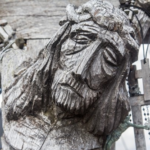We run our website the way we wished the whole internet worked: we provide high quality original content with no ads. We are funded solely by your direct support. Please consider supporting this project.
Is the open view the only view that is compatible with the Incarnation?
Question: You have said that the Open view of God is the only view that squares with the Incarnation and the only view that truly exalts God’s greatness. On what basis do you say this?
Answer: The revelation of God in the Incarnation is the ultimate expression of God’s willingness and ability to change that is depicted throughout Scripture. In the Incarnation, God is portrayed as the One who, out of love for a lost and enslaved race, altered his state of being to become human (Phil. 2). The incarnation reveals that God is not, as the classical tradition held, “immutable,” “impassible” are “devoid of potentiality.”
This is confirmed throughout the rest of Scripture. Because of God’s love for humanity, Scripture portrays God as continually adapting and responding to the ever-changing human situation. God changes his plans, revises decisions, expresses emotions, implements new strategies, and so on, in response to the flow of human history. Rather than portraying change as a defect, as classical theism tends to do, Scripture portrays change as a facet of God’s greatness, supremacy and sovereign beauty!
In Jeremiah, for example, Yahweh portrays himself as the master potter, exercising control over the clay (creation in general, and Israel in particular), precisely because he is willing and able to change his plans for a nation in response to its character (Jere. 18:5–10). He is God and has the right to change—even after he has prophetically declared a certain coarse of action.
For example, in response to the Ninevites’ repentence, God changed his mind about destroying them (Jonah 3–4). In response to Moses’ intercession, God changed his mind about judging Israel harshly (Exod. 32:12–14). And in response to Hezekiah’s prayers, God graciously altered his prophecy concerning his death (Isa. 38:1–5). For good reason, then, the prophets Jonah and Joel proclaim that God’s willingness to change his plans is one of his gracious attributes (Jon. 4:2, Joel 2:13)!
An inferior deity would carry out his sovereign plans regardless of any change on the part of human subjects—viz. he would behave just as Aristotle, Augustine, Aquinas and much of the classical tradition concluded God must behave! But Scripture portrays God as “gracious and compassionate, slow to anger and abounding in love,” and that he is “a God who relents from sending calamities” (Jonah 4:2).
These biblical depictions of God changing his plans are not isolated. Scripture generally depicts God as One who is unchanging in character and perfectly resourceful in adapting his character to the changing situations of world history. For this reason God is exalted as being a “wise” God. God doesn’t ordinarily choose to control all things (which would require power, but no wisdom). Instead, God is infinitely resourceful in working toward his desired ends in the midst of a cosmos that is populated with free, self-determining agents.
The Incarnation is at home in the biblical narrative because the entire narrative portrays God as being genuinely responsive to his creation and open to change. By contrast, the Incarnation is not at all at home in the Hellenistic and Classical Traditions that describe God as being “above” such things.
Category: Q&A
Tags: Incarnation, Jesus, Open Theism, Q&A
Topics: Christology, Defending the Open View
Related Reading

Do the Gospels Fabricate Prophetic Fulfillment?
Skeptically-inclined scholars, and especially critics of Christianity, frequently argue that the Gospel authors created mythological portraits of Jesus largely on the basis of OT material they claim Jesus “fulfilled.” In other words, they surveyed the OT and fabricated stories about how Jesus fulfilled those prophecies. In response, it’s hard to deny that there are certain…

Lord Willing? Part 1
Greg sat down with Jessica Kelley recently to talk with her about her book Lord Willing?. We’re posting their conversation in three parts. Today, in part 1, Jessica shares the story of when her son Henry was diagnosed with an aggressive brain tumor at age 4. You can find part 2 of the interview here, and part…

What Would You Do If Someone Attacked Your Family?
The New Testament commands us never to “repay evil with evil” but instead to “overcome evil with good” (Rom.12:17; cf. I Thess 5:15; I Pet 3:9). Jesus said, “Do not resist an evildoer. But if anyone strikes you on the right cheek, turn the other also”(Mt 5:39). He also said, “Love your enemies, do good…

Neo-Molinism and the Infinite Intelligence of God
Classical Molinism holds that, since God is omniscient and knows all truths, he knows not only what every agent will do in the future, but also what every agent would have done in every other “possible world.” In this essay I argue that classical Molinism overlooked a whole category of truths that an omniscient God…

Podcast: How is Jesus Both God and Human?
Greg discusses the incarnation from the perspective of “God as Human” rather than “God and Human.” http://traffic.libsyn.com/askgregboyd/Episode_0252.mp3

How do you respond to 1 Timothy 1:9?
“[God] saved us and called us with a holy calling, not according to our works but according to his own purpose and grace. This grace was given to us in Christ Jesus before the ages began…” Compatibilists sometimes appeal to this verse to support the view that God determined who would (and thus who would…
